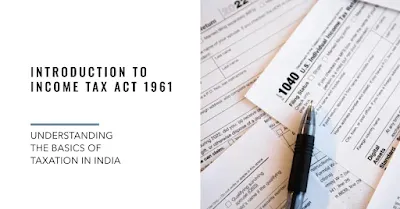In India, Income tax is a tax you pay to the government based on your income. The government uses this tax money for various purposes including public services, infrastructure development, defence spending and subsidies among other options. It is compulsory that one has to pay income tax if the income he or she earns crosses beyond a certain limit.
What Is Tax?
Tax is a mandatory financial charge which levied by the government on Individuals or Corporates. The government is charged tax on the income of the person or, on the product and services. Tax is one of the primary sources of income for the government through which it fulfills various projects and initiatives.
Types of Tax in India
There are two types of Tax in India
- Direct Tax
- Indirect Tax
What Is Direct Tax?
The direct tax is the tax that is levied by the government directly on the income or wealth of the persons. The direct tax is directly paid to the government. The assessee will be liable to the payment of direct tax for there income generated in the previous year. The assessee is responsible for their tax, they cannot transfer their tax liabilities to another person. Example - Income Tax.
What is Indirect Tax?
The indirect tax is the tax which levied by the government on the price of Goods and Services. In the case of indirect tax, the government collected tax from goods and services, so in some cases tax, liability will pass from one person to another person. Example - Goods and Service Tax (GST).
Why Taxes are imposed?
The main reason behind imposing taxes is Revenue generation for the government. Tax is the basic source for revenue generation for the government. The government uses these revenues for meeting the following goals:-
1) for improvement of the defense system of the country.
2) for the development of infrastructure of the country, like Bridge, Dam, Highway, etc.
3) for providing a better education system to citizens of the country.
4) for the development of the health sector for citizens of the country.
Types of Direct tax
- IncomeTax
- Wealth Tax
- Capital Gain Tax
Types of Indirect tax
- Goods and Services Tax.
- Custom Duties.
What is the Income Tax?
Income tax is a tax imposed by the government from an individual, or corporate entity for there income or profit generated in the previous year.
Formation of the Income Tax Act
In India, the income tax act was formed on the 1st of April 1962. The act applied to the whole part of India, except Jammu & Kashmir.
The Income Tax Act, 1961 changes every year with additions and deletions brought out by the Anual Finance Act passed by Parliament.
Sometimes, the Government brings the Taxation Law Amendment Act also for amending the provisions of the Act.
Various Heads of Income under the Income Tax Act 1961
Income tax is charged on the income of the assessee. As per the income tax act, there are five heads of income for calculation of income tax.
- Income from Salary - Salaries, Pension, earned is taxable under this head.
- Income from House Properties - Rental income is taxable under this head.
- Profits and gains from Business & Professions - Income derived from carrying on any Business or Profession is taxable under these heads.
- Capital Gain - Profit from sale of capital assets is taxable under this head.
- Income from Other Sources - Income chargeable to tax but not chargeable in the first four heads will be taxed under this head.
Before calculating income under the various heads first, you need to know the residential status of the assessee. So first need to know about the residential status.
What is the residential status?
Residential status helps to calculate the tax liability of the assessee. It shows that the assessee (Taxpayer) is resident or non-resident. Residential status helps to determine that income generated by the assessee within the country or outside of the country is taxable under income tax act or not.
(See Article :- Residential Status Under Income Tax Act 1961. )
Check Quality of Article

